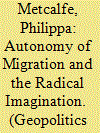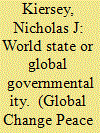|
|
|
Sort Order |
|
|
|
Items / Page
|
|
|
|
|
|
|
| Srl | Item |
| 1 |
ID:
184311


|
|
|
|
|
| Summary/Abstract |
This paper discusses biometric borders in Europe, focusing on the Eurodac database and practises of fingerprinting people on the move in Greece as a politicised attempt to control and limit secondary movement as set out in the Dublin Regulation. The paper presents empirical research to explore one way in which migrants in Athens negotiate Eurodac; where alternative imaginaries informed ideas of ‘big’ and ‘small’ fingerprints, shaping interactions with the asylum service as well as secondary movement. I use Autonomy of Migration (AoM) theories to depict borders as places of ongoing conflict, subjectivity and transformation and introduce the work of Castoriadis’ social imaginaries and the radical imagination to explore migrants’ alternative imaginaries. I argue that these occur at points of friction, within the constraints of, and alongside, a dominant socio-technical imaginary driving the proliferation of biometric border controls. I believe this enables a deeper understanding of the autonomy with AoM theories. Here, autonomy is presented as instances of self-creation, spurred on through the radical imagination and shaping moments of uncontrollability, where the subjective dimension of migration informs both meanings of autonomy as well as alternative imaginaries. Ultimately, I argue that these practices seek to disrupt and challenge the dominance of biometrics as a signifier of control, identity and truth.
|
|
|
|
|
|
|
|
|
|
|
|
|
|
|
|
| 2 |
ID:
184071


|
|
|
|
|
| Summary/Abstract |
Drawing on immersive ethnographic fieldwork at three events in Scotland, all grounded in ecological sensibilities and focusing respectively on alternative medicine, music and reviving seasonal celebrations, this article illuminates aspects of what we call ‘festive commoning’. We ask: how, and to what extent, were commons ‘against and beyond’ capital produced in these gatherings? We re-read a history of resistance to festive autonomy in this light, as a continuing struggle against capitalist enclosures of time, space, knowledge, history and being in the world. We argue that alternative grassroots gatherings can produce a ‘festive commons’ that resists such enclosures, including breaking down divisions between self and other, human and non-human beings. Such processes generate collective joy, and enliven the radical imagination. Experiencing festive commons is not only an aspect of the pleasure valued in some radical traditions, but also makes another world possible, even if only a temporary one.
|
|
|
|
|
|
|
|
|
|
|
|
|
|
|
|
| 3 |
ID:
085720


|
|
|
|
|
| Publication |
2008.
|
| Summary/Abstract |
Abstract This article addresses recent theoretical discussion about the state under conditions of globalisation, focusing in particular on recently popular 'world state' theory, as articulated by Martin Shaw and Alexander Wendt. It suggests that while world state theory is useful to the extent that it historicises the function of the state, it can be challenged for its uncritical approach to the question of how state power is actually constituted. To make this argument, the article refers first to an emerging Marxist critique that focuses on liberal hypocrisy and the role of imperial violence in the formation of the world state. However, while this approach reveals the elision of many forms of violence in world state theory, it shares world state theory's tendency to avoid exploring the role of more constitutive forms of power. Challenging this view, the article turns to Foucault's theory of governmentality and some recent applications of it to Imperialism, Empire, and the War on Terror.
|
|
|
|
|
|
|
|
|
|
|
|
|
|
|
|
|
|
|
|
|